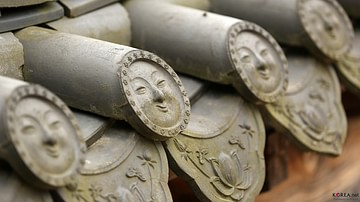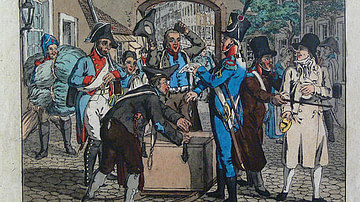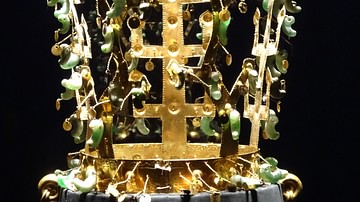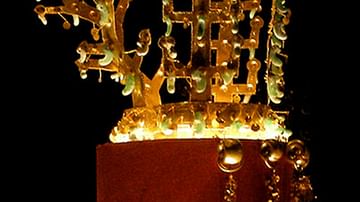
The hwarang was a state-sponsored organisation for the education of elite young males in the ancient kingdom of Silla, Korea. Variously translated as the 'Flower Boys,' 'Flowering Youth,' or 'Elite Youth' (and sometimes, too, the rather misleading 'Knights'), the hwarang pledged loyalty to the state, their family, and each other. The boys often met in places of great natural beauty, especially sacred mountains and rivers, where they sang and danced with their faces painted and wore jewelled shoes. The organisation aimed at preparing young males for their future role in society and the majority of the state's most important politicians and administrators were educated in the hwarang.
Formed from at least the 6th century CE, the hwarang consisted of teenage boys who followed the ideal known as pungwolto or 'way of wind and moon.' It is not clear what this meant exactly, but it is known from Korean history sources such as the Samguk sagi and Samguk yusa that the boys followed an educational mix of religious and martial teachings along with music, dancing, ethics, and a good dose of nationalism, including a defiance of death. Only sons of the aristocracy were eligible to join, and the true purpose of the system, sponsored as it was by the state, was likely to enable the ruling class to select the most talented youths and earmark them for future positions within the state apparatus.
The religious part of the education was, as in wider Korea, a mix of Buddhism, Taoism, and Confucianism with, probably, elements of shamanism which was long practised in the peninsula. The Samguk yusa adds that the boys also studied the Five Relationships, the Six Arts, the Three Scholarly Occupations, and the Six Ways of Government Service, which all contained rules of ethical behaviour and prepared the students for life in the civil service. The Five Relationships (sesok ogye) honour code, created by the Buddhist monk Wongwang in the early 7th century CE, best illustrates the strong association between the hwarang and the needs of the state for they were:
- To serve the king with loyalty.
- To serve one's parents with loyalty.
- To always show loyalty to one's friends.
- To never retreat in battle.
- To never kill unnecessarily.
The precise organisation of the hwarang is not known beyond that the leader of a single group of a few hundred youths held the title of kukson or 'National Immortal.' He was selected from the true bone or chingol class of the Silla kingdom's rigid social hierarchy, the Bone Rank System. The kukson was assisted by several Buddhist scholar-monks who likely carried out the instruction. The patron of the group was the Maitreya Buddha (the coming Buddha), also know as 'the Friendly One,' indeed, members considered themselves reincarnations of Buddha. The hwarang was divided into subgroups which had Buddhist-associated names such as 'the Band of the Dragon Flower Tree' (referring to the tree where Maitreya first arrived on earth).
Details are lacking of the initiation ceremonies the boys carried out except that dancing and singing were important elements, as was an oath of loyalty to fellow members. Hwarang members and ideals were celebrated in hyangga, the indigenous folk song-poems of Korea. Indeed, many were written by members of the group. In this example, written by Tugo and titled Mo Chukchirang ka or 'Ode to Knight Chukchi' written c. 692-702 CE, the author praises his master:
All living beings sorrow and lament
Over the spring that is past;
Your face once fair and bright
Is about to wear deep furrows.
I must glimpse you
Even for an awesome moment.
My fervent mind cannot rest at night
In the mugwort-rank hollow.
(Lee, P.H., 72)
Some of the most famous former members of the hwarang are the great general Kim Yu-sin, his son Won-sul, and Kwanchang, who gave his life bravely in a battle against the Baekje (Paekche) kingdom in 660 CE. Following a rise in Korean nationalism and the discovery of a manuscript titled The Chronicles of the Hwarang (Hwarang segi) in the 1980s CE there has been a renewed interest in the subject, with even a new television series scheduled for December 2016 in Korea based on the hwarang and carrying that title.
This content was made possible with generous support from the British Korean Society.





